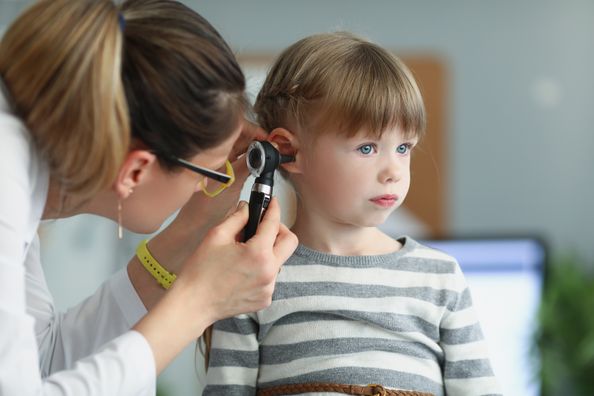Pediatric ear, nose, and throat disorders remain among the primary reasons children visit a physician. Ear infections rank as the number one reason for an appointment, according to the American Academy of Otolaryngology‒ Head and Neck Surgery Foundation.
As we recognize Pediatric Kids’ ENT Month, we highlight our Ear, Nose, and Throat (ENT) team. The QMG team includes (pictured here from left to right) Ryan Owens, NP‑C; Paul Conrad, MD; Abraham Sheffield, MD; and Katie Ayres, CNP. They care for patients of all ages.
Ayres specializes in pediatrics and joined the ENT team a little over a year ago after working in QMG’s Pediatrics department. We spoke to Ayres about the uniqueness of caring for our community’s youngest patients.
In 2008, Ayres started her career as a Pediatric nurse and, in 2013, decided to further her education to become a Pediatric Nurse Practitioner. Before coming to QMG, she worked at Children’s Mercy Hospital, where she worked in both in-patient and emergency room/urgent care. She eventually came back home to Quincy, where she began her career at QMG.
The opportunity to spend her days with kids makes Ayres’s workdays not only meaningful but fun.
“I just love kids. I have always loved kids. I think it’s fun to be part of their lives and see them grow. I get to kind of play while I’m at work,” she said. “I try to make going to the doctor not so scary. I let them touch the equipment, let them see what it does, and answer their questions. The more you can make it a fun experience for them, the better they will do in other areas when they go to the doctor.”
Similar to the national statistics, Ayres said her team sees concerns related to ear infections most often, followed by sleep concerns, throat infections, and tonsil concerns.
“Ear infections are common in kids, but when kids begin getting recurrent ear infections, it’s more concerning, especially if they have had three ear infections in six months or four in a year, or if they have persistent fluid in the ears,” Ayres shared. “We see a lot of kids for ear tubes, of course, for tonsil concerns, too, whether that be for recurrent throat infections or concerns about sleep apnea in kids.”
Sometimes those concerns can lead to surgery, performed by Ayres’s physician colleagues Dr. Conrad and Dr. Sheffield at the QMG Surgery Center. A couple of times a month she goes to the Surgery Center along with the physicians, which has given her more insight into what her young patients can expect.
“I’m a mom of three young kids and I know what it’s like to be up with a sick kid at night and be worried about going in for different procedures,” she said. “The nice thing about going to the Surgery Center with Dr. Sheffield and Dr. Conrad is that sometimes I’m there with the kids while they’re in surgery. That has given me a really good idea of what they can expect there. Sometimes just knowing step by step what to expect can be very comforting for the parent and the child.”
Being there every step of the way and seeing her patients’ recover is what Ayres finds most rewarding.
“I don’t think there’s anything that makes me happier than when I see a child prior to getting tubes, when they’re having issues with their hearing, and then after they get their tubes, we repeat their hearing test and they have normal hearing again. Or, when a parent tells me their child stops breathing when they sleep and they’re scared, but after their tonsils are out, they come in and their child is now sleeping better,” she shared. “There’s nothing more rewarding than to hear these things that have changed these kids’ and parents’ lives.”
Ayres said if you have concerns about your child’s ear, nose, or throat health, parents/guardians should speak to their child’s primary care provider.
Health Topics:







